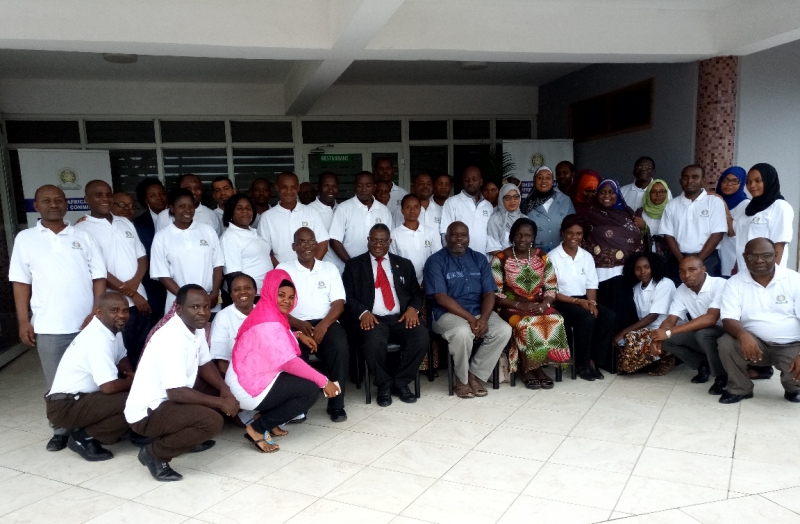
Use Kiswahili Soft Power to enhance regional integration and sustainable development-EAC Official urges the Community
East African Kiswahili Commission, Zanzibar, 13th April, 2018:
The East African Kiswahili Commission (EAKC) has been urged to use Kiswahili soft power to accelerate and enhance regional integration and sustainable development in the East African Community (EAC). This call was made by the Deputy Secretaries General of the EAC, Hon. Jesca Eriyo (Finance and Administration) and Eng. Steven Mlote (Planning and Infrastructure) during a national Training Workshop on Capacity Assessment of the Development and Use of Kiswahili in the United Republic of Tanzania.
The Workshop was organized by the EAKC at a Dar-es-Salaam hotel on 10th -11thApril, 2018 and attended by 35 participants drawn from various stakeholders from across the United Republic of Tanzania.
Hon. Jesca Eriyo observed that capacity assessment is an important milestone in the implementation of the Commission’s Strategic Plan of harmonizing and promoting the development and use of Kiswahili in regional integration and sustainable development. She noted that Kiswahili is an important power and resource that can help the community in realizing its agenda.
Hon. Eriyo singled out the United Republic of Tanzania for having realized the importance of Kiswahili in national cohesion at an early stage. She said that there are important lessons for the rest of EAC Partner States to learn from Tanzania in integrating Kiswahili in national development plans, prorammes and projects. She noted that Kiswahili is fast spreading across the region and beyond, and being used at multiple levels to transmit knowledge and values.
In his address to the participants, the Deputy Secretary in charge of Planning and Infrastructure, Eng. Steven Mlote appreciated the importance of Kiswahili in various development domains. He noted that whereas infrastructure development is largely understood as depending on hard power, Kiswahili as a soft power is equally important and necessary for holistic development.
Eng. Mlote observed that in their interactions with citizens of East Africa, various professionals require appropriate Kiswahili communication skills to be effective. ‘Kiswahili is so dynamic that different East African communities and professionals are interacting and using it in different ways. You cannot talk of the development and use of Kiswahili without referring to Kiswahili for specific purposes, including the movement of various professionals.’
Eng. Mlote urged the researchers to find out what skills need to be developed and asked the Commission to develop them. To demonstrate its commitment to the development and use of Kiswahili in the EAC, Eng. Mlote urged the Commission to develop and implement Kiswahili programmes at the EAC Secretariat for Staff and other international community in Arusha who may require them.
In his remarks, the EAKC Executive Secretary, Prof. Kenneth Simala, said that the Workshop in Dar-es-Salaam was part of a series of regional trainings that are taking place across all EAC Partner States.
He said that though generally not appreciated, the language question is at the core of EAC regional integration and development. Prof. Simala observed that Kiswahili language cannot be considered as just an instrument of wider communication, but as a regional identity marker with a strong symbolic value, and a resource in economic development of the Community in terms of popular culture as well as creative industries.
He noted that Kiswahili linguistic governance in EAC is a very technical and political matter that the Commission is navigating with care and caution in the context of regionalization and globalization.
The ES promised to initiate Kiswahili programmes at the Secretariat so that those desirous to learn Kiswahili can be facilitated.
For more information, please contact:
Executive Director
East African Kiswahili Commission
Maisara Street
P.O. Box 600
Zanzibar, Tanzania
Tel: +255 024 2232704/
+255 024 2232722
This email address is being protected from spambots. You need JavaScript enabled to view it.
This email address is being protected from spambots. You need JavaScript enabled to view it.
About the East African Kiswahili Commission:
The East African Kiswahili Commission (EACK) is an institution of the East African Community based in Zanzibar, The United Republic of Tanzania. The Commission started its operations in May, 2015 and has developed the Annual Operations Plan for 2016-2017. The Commission’s vision is to be the leading body in the promotion and coordination of the development and usage of Kiswahili for regional integration and sustainable development.
